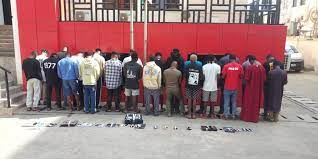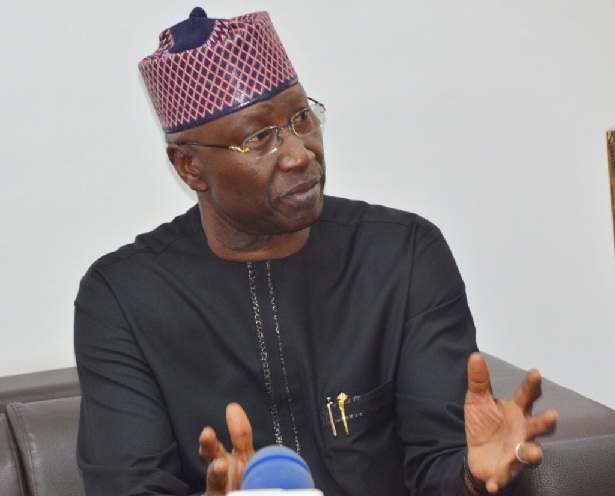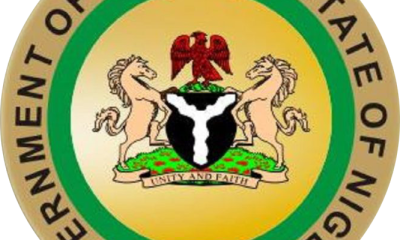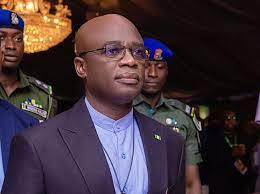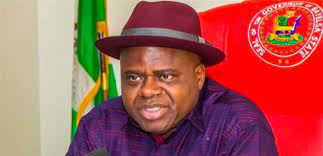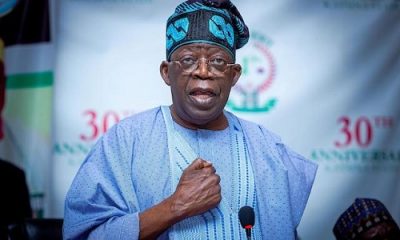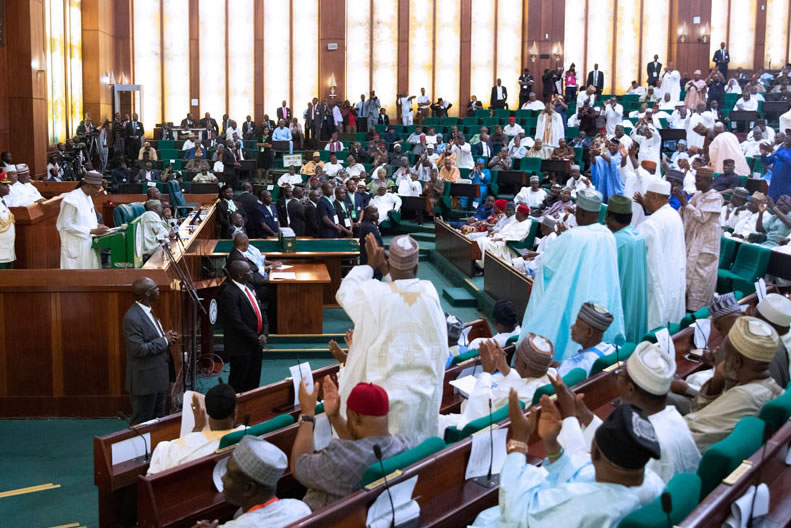Economy
Buhari Constitutes Committee to Assess COVID-19 Effect on Economy

By Mathew Dadiya, Abuja
In a prompt effort to curtail the impact of the COVID-19 otherwise known as Coronavirus on the Nigerian economy with the plunge in the global oil prices from $53 last week to $35, President Muhammadu Buhari has constituted an economic committee to review the oil benchmark in the 2020 budget.
The committee which is chaired by the Minister of Finance, Budget and National Planning, Mrs Ahmed had the Minister of State, Petroleum Resources, Timipre Sylva, Minister of State, Budget and National Planning, Prince Clement Agba, Governor of the Central Bank of Nigeria (CBN), Godwin Emefiele and the Group Managing Director of Nigeria National Petroleum Corporation (NNPC), Mela Kyari as members.
Speaking with State House correspondents on Monday, after meeting with President Buhari at the President Villa, Abuja, the Minister of Finance, Budget and National Planning disclosed that the committee would review the $57 crude oil price benchmark in the budget and might reduce the 2020 budget.
She said: “Mr. President has formed us into a committee with the minister of State, Petroleum Resources, the Central Bank governor, GMD NNPC and myself as members.
“Our mandate is to make a very quick assessment of the impact of this coronavirus on the economy especially as it effects the crude oil price.
“We will be writing a report and brief Mr. President tomorrow (Tuesday) or Wednesday morning. After that we will also have more substantial information for the press.
“It is very clear that we will have to revisit crude oil benchmark price that we have of $57 per barrel. We have to revisit it and lower the price. Where it will be lowered is the subject of this committee. What the impact will be on that is that there will be reduce revenue to the budget at it will cut the size of the budget. The quantum of the cut is what we are supposed to assess as a committee.”
Asked if Nigeria intends to dialogue with Russia and other OPEC+ members to cutdown oil output, the Minister of State Petroleum, Timipre Sylva, said, “we as a member of OPEC are not in a position to take that engagement on our own unilaterally. There was a disagreement between OPEC and OPEC+, it’s not just Russia, but the biggest producers within OPEC and OPEC+ which are Saudi Arabia and Russia.
“We believe that in the coming days when all of us would have begun to see effect of the reduction of prices, OPEC and OPEC+ might need to meet again and reconsider our positions.
Meanwhile, Sylva said that they expected also that a lot of discussions were going on at the level of Saudi Arabia and Russia, but as Nigeria, “we are not in a position to begin to engage members on this matter.”
Oil prices suffered their biggest fall since the day in 1991 when American forces launched air strikes on Iraqi troops following their invasion of Kuwait.
Monday’s crash spooked markets crash that were already freaking out about the impact of the coronavirus pandemic on the global economy and demand for oil. Brent crude futures, the global oil benchmark, were down 22%, last trading at $35.45 per barrel. US oil is trading at $33.15 per barrel, a decline of nearly 20%
Here are five things you need to know:
Why are oil prices crashing?
Saudi Arabia, the world’s top exporter, launched a price war over the weekend. The move followed the imposition of an alliance between the OPEC cartel, led by Saudi Arabia, and Russia.
The kingdom and Russia came together to form the so-called OPEC+ alliance in 2016 after oil prices plunged to $30 a barrel. Since then, the two leading exporters have orchestrated supply cuts of 2.1 million barrels per day. Saudi Arabia wanted to increase that number to 3.6 million barrels through 2020 to take account of weaker consumption.
But Russian President Vladimir Putin, worried about ceding too much ground to American oil producers, refused to go along with the plan and his energy minister, Alexander Novak on Friday signaled a fierce battle to come for market share when he said countries could produce as much as they please from April 1.
Why did Saudi launch a price war?
Simmering differences over how best to manage global oil markets spilled into the open at a meeting between OPEC and Russia in Vienna on Friday.
CNN Business quoted sources as saying that after Russia said it was ditching the alliance, Saudi Arabia warned it would live to regret the decision.
Moscow had become tired of cutting production to stabilize prices and felt that the policy of supply restraint gave more room for US shale companies to grow. Mikhail Leontiev, a spokesperson for Russian state oil company Rosneft, described the OPEC+ deal as “masochism.”
“By yielding our own markets, we remove cheap Arab and Russian oil to clear a place for expensive US shale oil and ensure the effectiveness of its production,” he told Russian state media on Sunday.
America has become the number one oil producer in the world and is expected to pump about 13 million barrels a day in the first quarter of this year.
Over the weekend, Saudi Arabia decided to fight for greater market share by slashing the prices its preferred customers pay by between $4-$7 a barrel. The kingdom is also reportedly planning to lift production to over 10 million barrels a day.
What does coronavirus have to do with all of this?
The coronavirus has undermined energy demand worldwide, but especially in China, which is now the number one importer of crude oil, guzzling roughly 10 million barrels a day.
Economy
Access Holdings Awards Shares Worth N427.13m to 8 Senior Executives
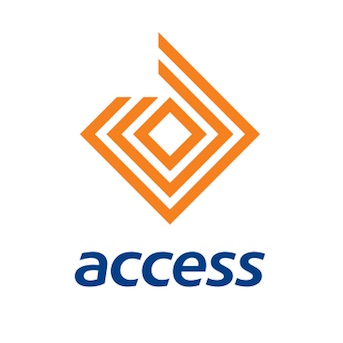
Access Holdings Plc has awarded 23.8 million ordinary shares worth N427.13 million to its senior executives and those of its subsidiary, Access Bank.
This was disclosed in a notice sent to the Nigerian Exchange Ltd.(NGX) in Lagos.
The notification was sent in line with the disclosure requirements of the Securities and Exchange Commission (SEC) and the NGX.
It is also in pursuant of the terms of its shareholders’ approved Employees Performance Share Plan.
The group said that Ms Bolaji Agbede, Acting Group Chief Executive Officer, Access Holdings, Mr Roosevelt Ogbonna, Managing Director/CEO, Access Bank, and six others were vested with 23,883,790 shares worth N427.
13 million in total.According to the filings, Ogbonna got the highest amount of shares, totalling 12,345,679 and valued at N220.37 million, having been traded at N17.85 per share.
Agbede was vested with 2,216,992 shares, valued at N39.795 million.
Other directors who had shares vested on them include: Mr Seyi Kumapayi, Executive Director, African Subsidiaries, Access Bank, with 1,234,568 shares worth N22.16 million.
Ms Iyabo Soji-Okusanya, Executive Director, Commercial and Investment Banking Division, Access Bank, got 1,691,308 shares at N17.95 per share, valued at N30.36 million.
Mrs Chizoma Okoli, Access Bank’s Deputy Managing Director, Retail South, also got 1,728,395 shares valued at N30.85 million.
Dr Gregory Jobome, Executive Director, Risk Management, and Hadiza Ambursa, Executive Director, Commercial Banking, were vested with 1,728,395 shares each,valued at N30.85 million and N31.02 million respectively.
Also, Access Holdings’ Company Secretary, Mr Sunday Ekwochi, was vested with 1,210,058 shares worth N21.72 milion.
The group stated that the shares were vested on May 3 and May 6.
It noted that the vesting of the shares was not a purchase or sale transaction in the context of the Exchange’s rules.(NAN)
Economy
CBN’s Cybersecurity Levy Ill-timed, Negates Financial Inclusion – Expert
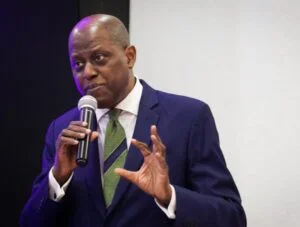
CBN Governor, Yemi Cardoso A financial expert, Prof. Uche Uwaleke says the newly introduced 0.5 per cent charges on electronic transactions as cybersecurity levy by the Central Bank of Nigeria (CBN) is ill-timed.
Uwaleke, a professor of capital market and the president of the Capital Market Academics of Nigeria, said this in an interview on Tuesday in Abuja.
According to him, the cybersecurity levy is ill-timed, coming at a time when the CBN is concerned about the high rate of financial exclusion and the increasing rate of currency circulating outside the banks.
He said that it carried the downside risk of discouraging financial intermediation as well as complicating the transmission of monetary policy with more people shunning the banks due to high charges.
“The end result is that it makes difficult effort by the CBN to tame inflation.
“So, I think the circular should be withdrawn, especially against the backdrop of assurances by the government that its plan to increase revenue would not include introducing new taxes or increasing tax rates.
“To this end, the government should suspend the policy while getting set to implement the recommendations of the Presidential Committee on Fiscal Policy and Tax Reforms,” he said.
He said that the mandate of the committee included streamlining multiple taxes and levies currently inhibiting the growth of businesses in Nigeria.
NAN reports that the CBN had on Monday directed all banks to commence charging a 0.5 per cent cybersecurity levy on all electronic transactions within the country.
The direcve was contained in a circular jointly signed by the Director, Payments System Management Department, Chibuzo Efobi; and the Director, Financial Policy and Regulation Department, Haruna Mustafa.
The circular was directed to all commercial banks, merchant banks, non-interest banks, and payment service banks.
It announced that the implementation of the levy would start two weeks from May 6.
“The levy shall be applied at the point of electronic transfer origination, then deducted and remitted by the financial institution.
“The deducted amount shall be reflected in the customer’s account with the narration, ‘Cybersecurity Levy,’” the circular said.
However, some 16 banking transactions were exempted from the new cybersecurity levy.
They include loan disbursements and repayments, salary payments, intra-account transfers within the same bank or between different banks for the same customer, intra-bank transfers between customers of the same bank among others.
By the calculations of the new levy, five Naira will be charged on a transaction of N1,000, while N50 will be charged on a transaction of N10,000.
Others are N500 charge on a transaction of N100,000, N5,000 charge on a transaction of N1,000,000, and N50,000 charge on a transaction of N10,000,000.
The cybersecurity levy will now be added to already existing bank charges like transfer fee, stamp duty, charges on SMS, and Vat .(NAN)
Economy
Trading on NGX Increases by 28%, Investors Gain N467bn

The Nigerian Exchange Ltd. (NGX) on Friday recorded 28.14 per cent increase in the value of equity transactions, resulting in investors gaining N467 billion.
Specifically, 446.57 million shares valued at N7.10 billion were exchanged in 9,297 deals, in contrast to 665.20 million shares valued at N5.
54 billion in 8,446 deals on Thursday.Consequently, the market capitalisation, which opened at N55.
856 trillion, gained 0. 83 per cent or N467 billion to close at N56.323 trillion.The All-Share Index also added 0.83 per cent or 825 points to close at 99,587.25, as against 98,762.78 recorded in the previous session.
As a result, the Year-To-Date (YTD) return rose to 33.
18 per cent.Renewed interest in MTN Nigeria, alongside Tier-one banks, Presco Plc, UACN, United Capital, among other leading stocks, sustained the market’s positive trend.
Also, market breadth closed positive with 27 advanced equities outnumbering 20 declined ones.
On the gainers’ chart, Presco led by N22.90 to close at N252.80, Dangote Sugar followed closely by N4.25 to close at N47, while Ellah Lakes Plc gained 30k to close at N3.32 per share.
Jaiz Bank also advanced by 21k to close at N2.35 and Flour Mill rose by N3.25 to close at N36.80 per share.
Conversely, Conoil and Tantalizers led the losers chart by N10.80 and 4k each to close at N97.20 and 36k per share, respectively.
McNichols Plc lost 12k to close at N1.14, Linkage Assurance trailed by 9k to close at 86k and Guinea Insurance shed 3k to close at 30k per share.
Meanwhile, Access Corporation led the activity chart in volume and value with 151.80 million shares worth N2.68 billion, followed by Veritas Kapital with 49.88 million valued at N30.91 million.
United Bank of Africa(UBA) traded 32.89 million worth N845.74 million, Universal Insurance sold 27.14 million shares valued at N9.76 million and Transnational Corporation transacted 21.82 million share worth N310.32 million. (NAN)




